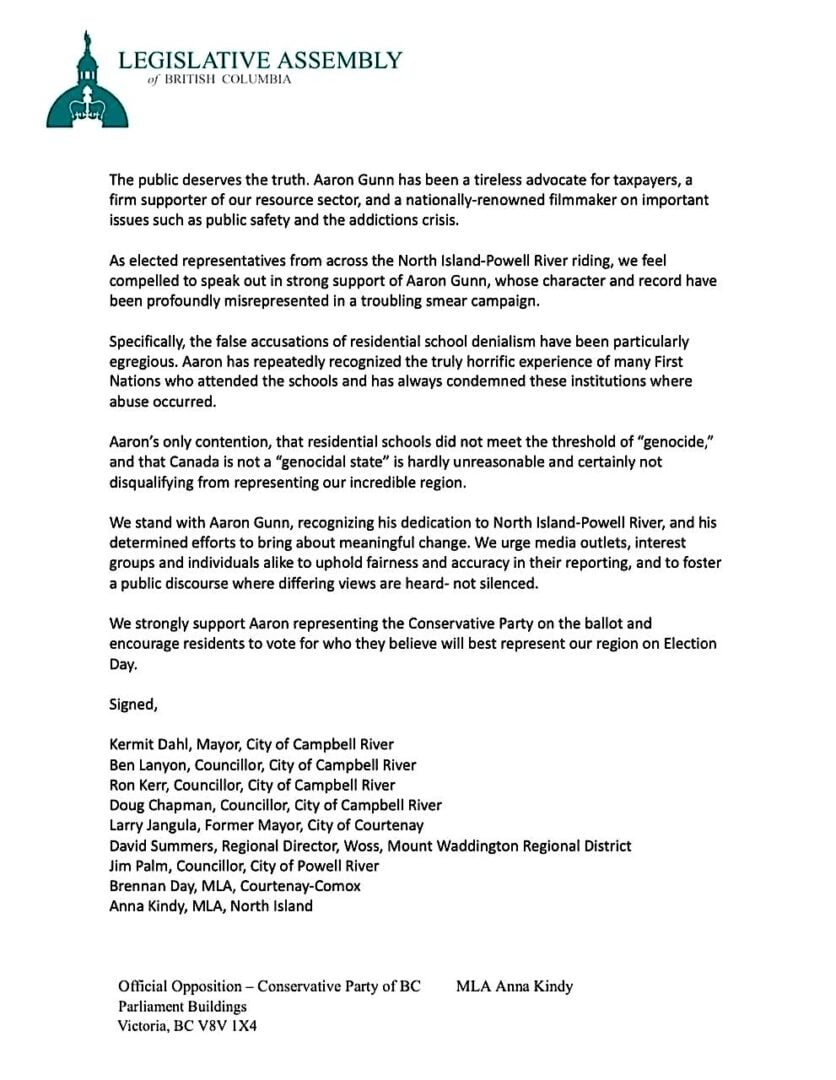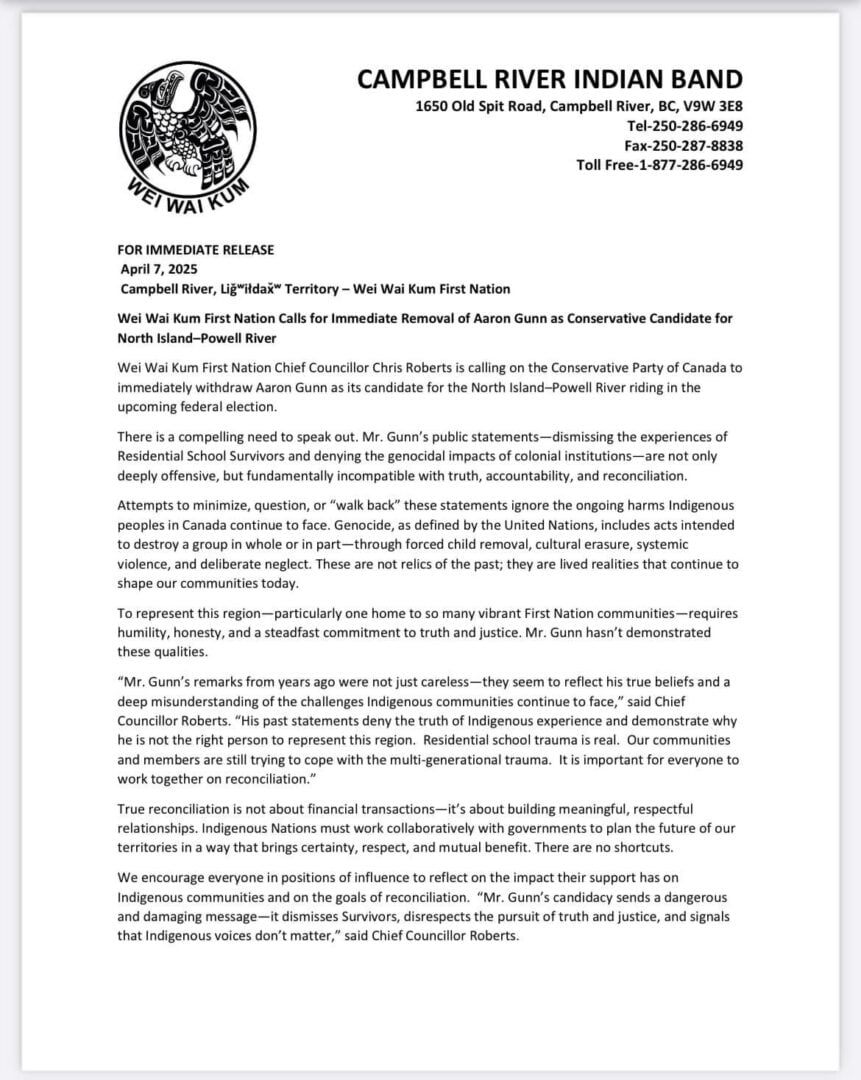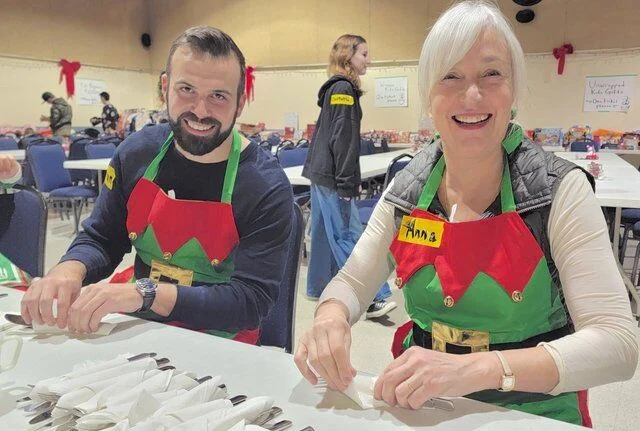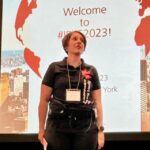Rochelle Baker, Local Journalism Initiative Reporter, Canada’s National Observer
Provincial and municipal politicians in the North Island-Powell River riding are joining the fray about whether embattled Conservative candidate Aaron Gunn should stay in the running for the federal seat.
Last week, First Nations located across the riding took Gunn to task for his long collection of social media posts that argue the treatment of Indigenous people in residential schools does not amount to genocide.
They demanded that federal Conservative Leader Pierre Poilievre remove him as a candidate, arguing Gunn has “absolutely no authority” to determine what constitutes genocide when it comes to Indigenous people’s experiences of residential schools.
In response, North Island Conservative MLA Anna Kindy posted a letter in support of Gunn signed by a handful of current and past politicians in the riding on official Legislative letterhead on her constituency’s Facebook site.
Brennan Day, Conservative MLA for Courtney-Comox, signed the letter, as did sitting Mayor of Campbell River Kermit Dahl and city councillors Ben Lanyon, Ron Kerr, Doug Chapman, and Powell River Coun. Jim Palm, Mt. Waddington Regional Director David Summers, and former Courtenay mayor Larry Jangula.

Poilievre and BC Conservative Party Leader John Rustad have also reaffirmed their support for Gunn. Poilievre attributed the discontent around Gunn’s comments to “misinformation.” Both Conservative leaders praised Gunn’s commitment to “economic reconciliation” with Indigenous Peoples, including rapidly green-lighting resource projects so First Nations and Canadians can bring home “powerful paycheques.”
Breach of conduct
Kindy’s letter provoked hundreds of responses for and against Gunn and the politicians backing him — but the letter has also spun off its own controversy as constituents call out Kindy and Day for using official legislative resources for partisan politics.
Elected members of the Legislature aren’t allowed to use constituency resources or legislative tools for political purposes, like advocating for candidates during an election. They’re also not allowed to include signatures of municipal leaders or other people not affiliated with the Legislative Assembly.
The office of the Speaker of the House didn’t provide comment on what steps, if any, would be taken against Kindy or Day for using their office resources to electioneer for Gunn.
“It’s about money, but it’s also about maintaining the ability to speak for all constituents and work that represents everyone in their district.”
Stewart Prest, Political Scientist at the University of British Columbia
Politicians do wear two hats: one as a party member, and the other as an elected official, said Stewart Prest, political scientist at the University of British Columbia. However, partisan work is expected to rely on individual or party resources, he said.
Politicians regularly take political stances, but shouldn’t use public funds or platforms dedicated to MLAs to communicate “official work” with constituents in the riding with various party affiliations, Prest said.
“It’s about money, but it’s also about maintaining the ability to speak for all constituents and work that represents everyone in their district,” he said.
Former BC Green Party MLA Adam Olsen called out Kindy and Brennen, “MLAs who respect the institution, the rules and the Speaker, just don’t ever use the Legislative Assembly of British Columbia branding or facilities to do partisan business.”
On April 7, Kindy emailed a statement to Canada’s National Observer about their decision to use official letterhead.
“Yesterday, a letter went out on my legislative letterhead regarding a local federal election candidate. This was a mistake, and it will not happen again. I take full responsibility for this error,” the statement said.
However, the offending letter remained on Kindy’s Constituency Facebook page and Gunn’s Facebook campaign page until the following day.

Kindy’s email did not address questions about whether she supports Gunn’s stance on residential school — or his other comments, including statements that there are only two genders, considered an attack on trans rights, the “gender pay gap doesn’t exist,” and systemic racism is a “myth.”
Day’s office also did not respond to questions or requests for comment from Canada’s National Observer about the letter or his support for Gunn’s comments. The two MLAs and Mayor Dahl have already officially endorsed Gunn’s candidacy on his website.
Gunn — a right-wing social media influencer from Victoria who parachuted into the riding as the Conservative candidate — has garnered negative attention for his social media posts before. He was rejected as a candidate for the BC Liberal leadership race in 2021 after party executives expressed diversity and reconciliation concerns.
After his social media history got renewed attention last week, Gunn cancelled a political rally in Powell River scheduled for Friday evening. Additionally, an all-candidates debate he was slated to attend on April 6 was abruptly rescheduled to April 22 “due to scheduling conflicts.”
Gunn has refused multiple requests for comment or interviews from Canada’s National Observer. He has not publicly apologized or retracted comments that have angered the First Nations.
“Aaron’s only contention, that residential schools did not meet the threshold of ‘genocide,’ and that Canada is not a ‘genocidal state,’ is hardly unreasonable.”
Anna Kindy, North Island Conservative MLA
In Kindy’s letter, the signatories argue Gunn has been “profoundly misrepresented in a troubling smear campaign,” suggesting media, groups, and individuals uphold “fairness and accuracy” in their reporting and ensure differing views in political discourse are not silenced.
Accusations of residential school denialism against Gunn “have been particularly egregious,” they said. Gunn has always recognized the horrific experiences at the schools and condemned them, the politicians wrote.
“Aaron’s only contention, that residential schools did not meet the threshold of ‘genocide,’ and that Canada is not a ‘genocidal state,’ is hardly unreasonable,” the letter stated.
The ongoing response by First Nations and a growing contingent of municipal leaders in the riding indicates that many people disagree.
More than 60 elected officials, hereditary and elected chiefs, and councillors in the riding have signed an open letter demanding Poilievre pull Gunn for his “unacceptable” comments, saying “his views and statements are particularly concerning and harmful in a riding with large numbers of First Nations constituents.”
In 2022, members of the House of Commons — including Pierre Poilievre — unanimously passed a motion acknowledging Canada’s treatment of Indigenous People in residential schools constituted genocide. Downplaying the harms done by debating whether their treatment constitutes genocide is a form of residential school denialism, experts say.
“We’re standing in solidarity and support of the First Nations, because there’s at least 20 [First Nations communities] in the region.”
Wendy Morin, Courtenay City Councillor
Signatories to the letter opposing Gunn’s candidacy include the sitting mayors of Port Hardy, Courtenay, Cumberland and Tahsis, and numerous councillors from those communities and others. A growing number of First Nations leaders in the region have also signed.
“There’s no lack of people who want to sign the letter, and they come from all different backgrounds and political stripes,” said Courtenay Coun. Wendy Morin.
“We’re standing in solidarity and support of the First Nations, because there’s at least 20 [First Nations communities] in the region,” she said. Dozens of First Nations leaders have also signed on to the letter, she said, adding “that’s in addition to those that spoke out earlier.”
It’s “mind-blowing” that Poilievre continues to support Gunn despite the widespread opposition in the riding, Morin said.
“I don’t know how much pressure it takes.”
‘Reconciliation isn’t a financial transaction’

Wei Wai Kum Chief Chris Roberts is the latest leader in the riding to issue a public statement, calling on Poilievre to pull Gunn, noting “attempts to minimize, question or ‘walk back’ these statements ignore the ongoing harms Indigenous Peoples in Canada continue to face.”
“True reconciliation is not about financial transactions — it’s about building meaningful, respectful relationships,” Roberts said, emphasizing he did not support any party and all elected officials needed to take note.
“Reconciliation is not a slogan. It demands partnership, recognition of rights and title, and long-term collaboration grounded in truth. …There are no shortcuts.”




